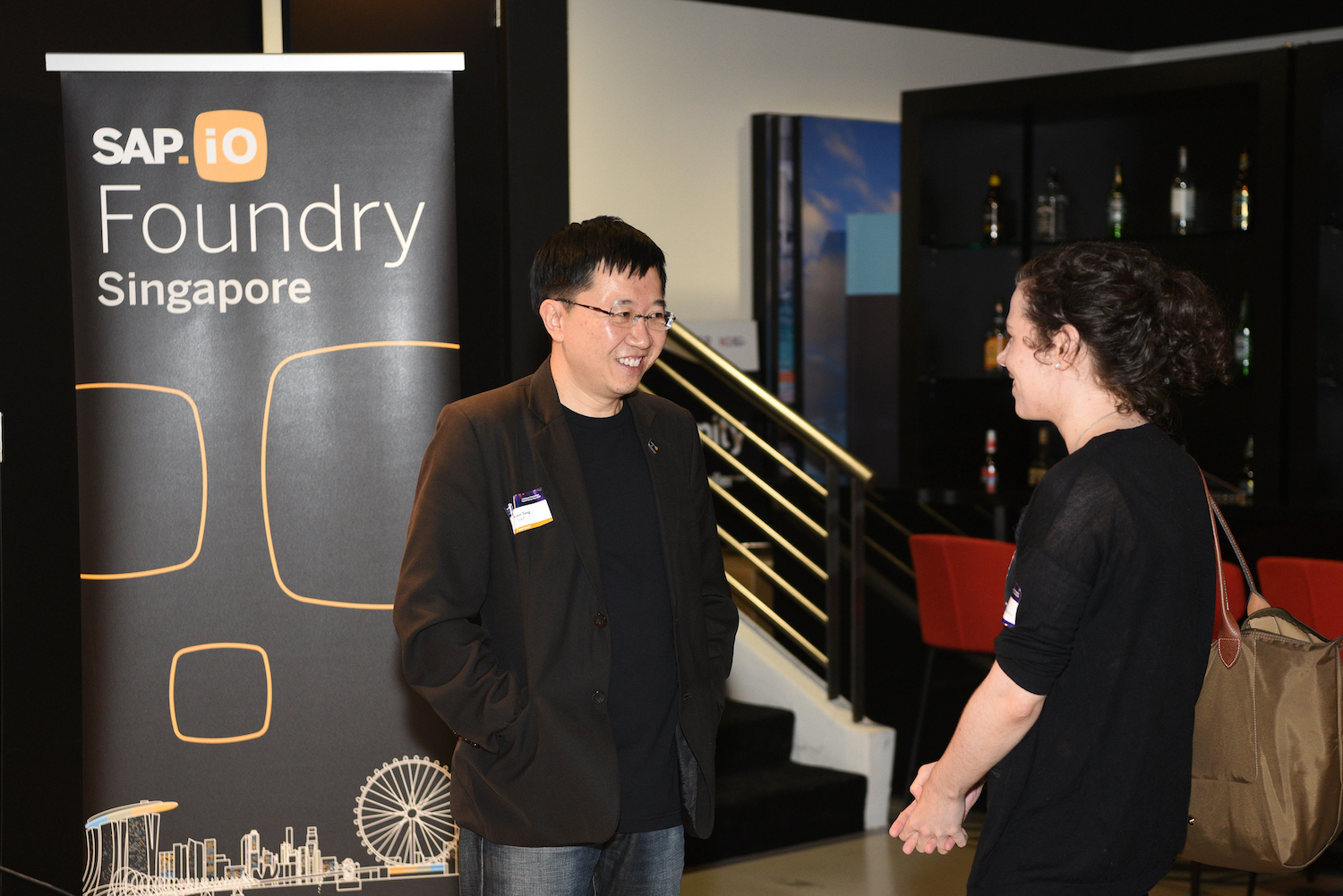Wake up daily to our latest coverage of business done better, directly in your inbox.
Get your weekly dose of analysis on rising corporate activism.
Select Newsletter
By signing up you agree to our privacy policy. You can opt out anytime.
Startup founders present their ideas to potential customers and investors at an SAP.iO Demo Day event.
Almost 90 percent of global financial and goods flows touch an SAP system. That kind of reach is almost unthinkable — and the tech giant wants to put it to work to empower diverse startup founders.
While the company doesn’t fund startups directly, its SAP.iO Foundries initiative arguably offers something even better. The program gives startups an opportunity to integrate within SAP’s technology ecosystem and develop relationships with the company’s vast network of customers, partners and employees.
Almost half the companies (44 percent) in SAP.iO’s global portfolio are founded or led by an underrepresented entrepreneur. Since 2017, the 525 companies incubated by SAP globally have raised around $11 billion in venture capital post-graduation from SAP.iO. They’ve also landed sales in the tens of millions thanks to connections made through the program and created around 36,000 jobs.
“The feedback that underrepresented people often get when they go to investors is, ‘You don’t have enough traction,’ whether that’s valid or not,” said Kange Kaneene, vice president of SAP.iO Foundries in North America, Latin America and the Caribbean. “What we can say is: We are going to give you that traction. We’re going to give you big contracts with big customers that are incontrovertibly impactful in whatever region or industry they sit in, and then we’ll help you fundraise by introducing you to people. And that’s something that the numbers show has been extremely successful for us.” 
SAP.iO seeks out early-stage startups in the enterprise software space. It’s hosted dozens of themed cohorts globally, aimed at identifying solutions that can add new desirable features to SAP’s technology ecosystem. A current cohort in New York, for example, is focused on digital supply chain innovations, while another recent cohort centered on sustainability in the consumer and retail segment.
Kaneene and her team leverage their networking prowess to assemble a list of 500 to 600 potential startups for each cohort. After several screening rounds, about 15 startups are put forward for what SAP.iO calls Selection Day, where they present their ideas to a selection committee made up of SAP customers, partners and investors. In the sustainability in retail cohort, for example, selection committee members included representatives from companies like Unilever, Levi Strauss and Red Bull — “big customers in the space that we think are probably representative of what the industry at large would want,” Kaneene said.
Ten startups are ultimately selected for each cohort, and they’re incubated by SAP.iO for five months. Their solutions are integrated into SAP’s technology portfolio and listed on the company’s marketplace, SAP Store, with the $2,000 listing fee waived for three years. Rather than taking an equity stake in portfolio companies, SAP shares in the revenue they take in from sales on the marketplace, Kaneene said. 
The startups also receive mentoring and expert go-to-market advice, as well as introductions to key stakeholders who can help them scale. Each cohort ends with a Demo Day, where startups present their refined business plans to potential customers and investors.
“When you are a startup that has a direct sales model — meaning you sell directly to an enterprise versus a consumer — it’s really hard,” Kaneene said. “You have to figure out what buying team within a corporation you need to approach. Then you have to figure out who the sole decision-maker is, and then how to actually contact that person. Because SAP has 450,000 customers globally, we already have those relationships.”
Since its inception, SAP.iO has connected portfolio startups to customers 7,000 times. Companies in SAP.iO’s portfolio span a range of sectors — from Anthill, a woman-owned startup that provides an SMS-based employee portal for deskless workers, to COI Energy Services, a Black-owned digital energy management platform for the commercial building sector.
But startups don’t have to be selected for a cohort in order to benefit. Startup founders meet with product and go-to-market leads at SAP during the screening process, and some of those conversations lead to new ideas for co-innovation. Those chosen to present to the selection committee have also received inquiries from customers even if they weren’t selected for the cohort, Kaneene said.
SAP.iO intentionally seeks out underrepresented founders, who it defines as entrepreneurs from groups whose venture capital funding is disproportionately low for their region. This varies globally but often includes women, people of color, LGTBTQ people and people from countries that tend to be overlooked by VC funders.
SAP.iO formalized its commitment to these founders in 2019 with the launch of SAP.iO No Boundaries, which it bills as “the first comprehensive inclusive entrepreneurship initiative for underrepresented and underestimated entrepreneurs in the business software industry.” It pledged to scale SAP.iO Foundries with a focus on diverse founders, aiming to support at least 200 startups founded or led by underrepresented entrepreneurs by 2023. It met that goal in July, six months ahead of schedule.
But incubating startups led by diverse founders is only the beginning. Creating a landscape in which these startups can succeed also means busting preconceived notions and changing hearts and minds.
“When I talk to external stakeholders about how we’re excited about the focus on underrepresented founders, their feedback is always, ‘Oh, so does that mean you’re compromising on quality?’ That’s always very frustrating, but we’re excited to say that [the startups led by underrepresented entrepreneurs] in the portfolio tie or surpass the rest of the portfolio on all the typical external metrics,” Kaneene said.
The 200 startups founded or led by underrepresented entrepreneurs make up 44 percent of SAP.iO’s global portfolio — and they represent half of the unicorns in the portfolio (meaning their valuation exceeds $1 billion), as well as 42 percent of cumulative VC funding. They also “have a greater likelihood to progress in their partnership with SAP,” according the company.
Metrics like these often run counter to what VC funders and other external stakeholders expect. “It always comes as a surprise,” Kaneene said. “People just cannot get their heads around the fact that diversity doesn’t mean crap. I don’t know why.”
But the success of the underrepresented founders in SAP.iO’s portfolio is starting to change those perceptions. “When I talk to VCs, a lot of times the reason they love working with us is because we provide a vetted list of startups they can evaluate,” Kaneene said. “When we can say, ‘Come to our Demo Day where we have 10 awesome digital supply chain companies — half of them diverse, all validated by real customers,’ they love it, because it de-risks that for them. It helps them understand that diverse founders are out there, and not only are they out there, but they are also validated by SAP and by the customer and we can show the revenue that they’re bringing in based on those relationships.”
Underrepresented founders are notoriously overlooked and under-funded. In the U.S., for example, less than 2 percent of all venture capital funding went to women-led startups in 2022. Only around 1 percent went to Black-owned startups. Numbers like those aren’t going to change overnight, and it will take action from the entire VC industry to move the needle.
“There are some fundamental screening criteria that are, probably even unintentionally, taking unrepresented founders out of the game,” Kaneene said. “A lot of venture capitals will say, ‘I only talk to people who came in from a warm lead.’ So, if your network isn’t diverse, then neither is anything else.”
Other VCs avoid investing in companies led by a sole founder or by a founder who is still working a day job while building their business, factors that overwhelmingly characterize underrepresented entrepreneurs. Further, venture capital favors big cities — in the U.S., more than 60 percent of all VC funding in the first half of 2022 went to startups based San Francisco, New York City or Boston — which can also hold underrepresented founders back.
While it can’t change the landscape on its own, SAP.iO provides a powerful proving ground for diverse founders with big ideas that can shake up the tech sector. “We believe that we’re finding the best companies overall and also we’re helping these underrepresented and overlooked founders,” Kaneene said.
Images courtesy of of SAP.iO
Mary Mazzoni has reported on sustainability in business for over a decade and now serves as managing editor of TriplePundit. She is also the general manager of TriplePundit’s Brand Studio, which has worked with dozens of brands and organizations on sustainability storytelling. Along with 3p, Mary’s recent work can be found in publications like Conscious Company, Salon and Vice’s Motherboard. She also works with nonprofits on media projects, including the women’s entrepreneurship coaching organization Street Business School. She is an alumna of Temple University in Philadelphia and lives in the city with her partner and two spoiled dogs.
Read more stories by Mary Mazzoni
Words by Tina Casey
Words by Mary Mazzoni
Words by Tina Casey
Words by Mary Mazzoni
Words by Tina Casey
Words by Mary Mazzoni
Words by Tina Casey
Words by Mary Mazzoni
Words by Tina Casey
Words by Mary Mazzoni
Words by Tina Casey
Words by Mary Mazzoni
Privacy Policy
© 2023 3BL Media & TriplePundit. All rights reserved.

